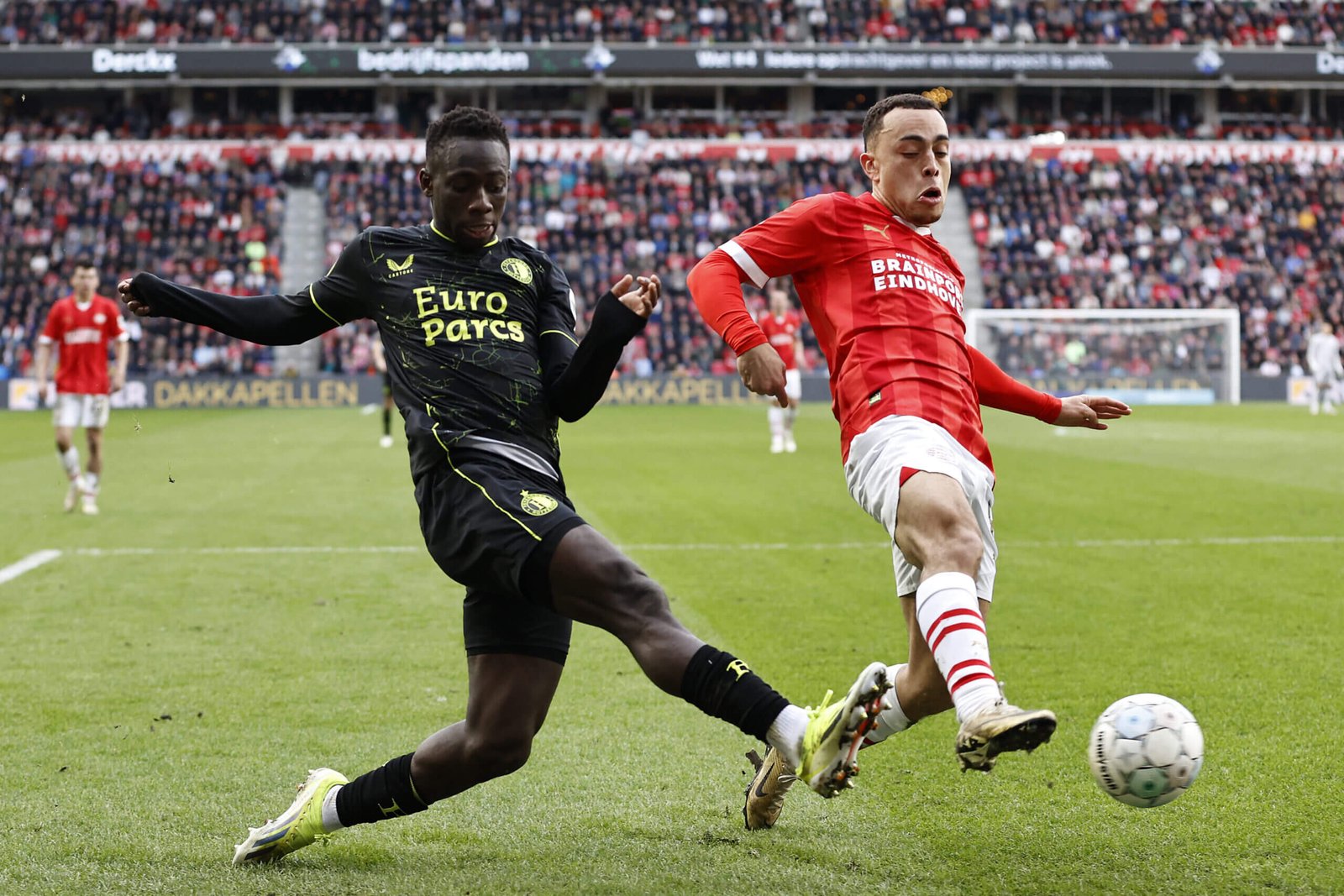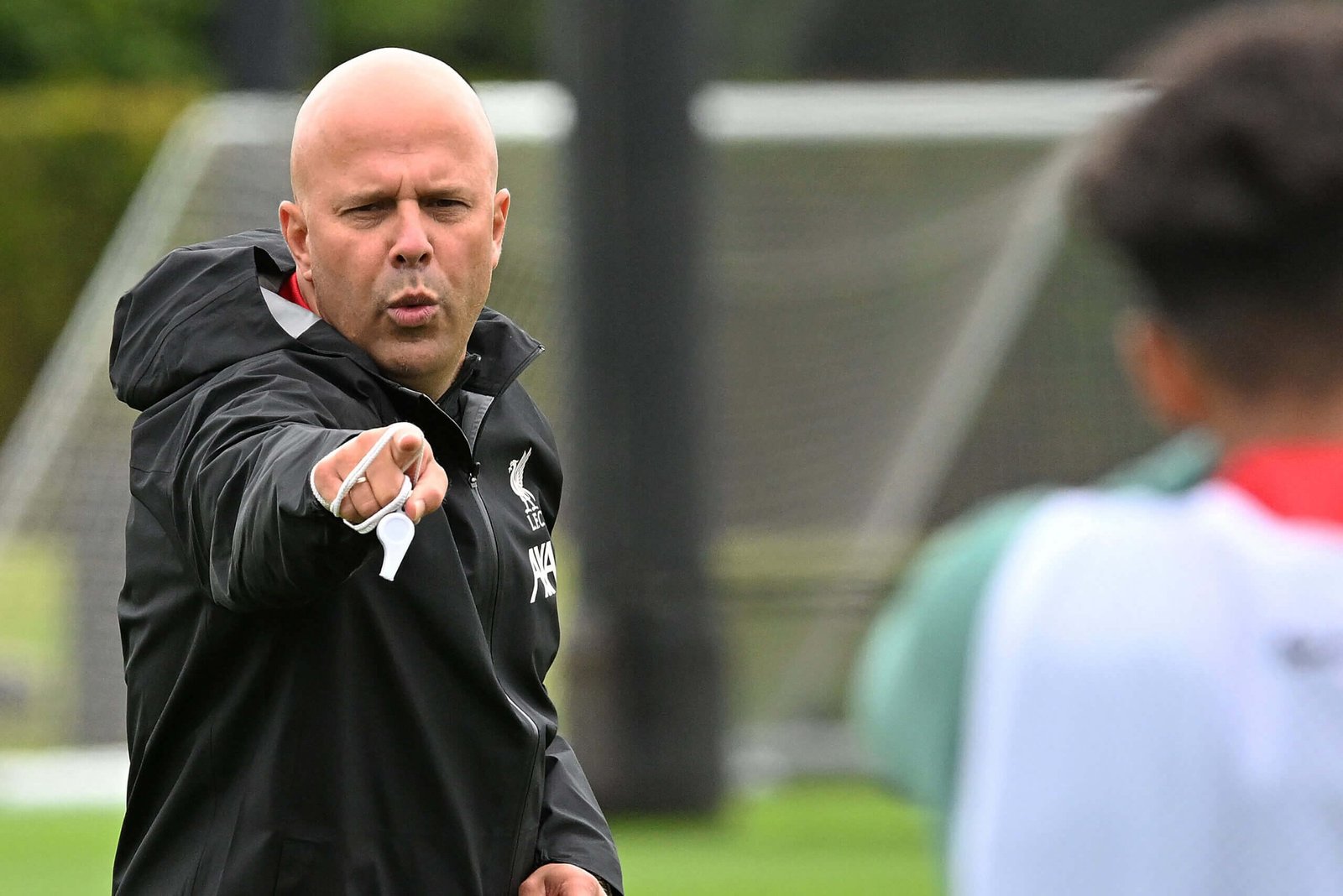If Arne Slot is the man to reignite Liverpool’s push for trophies, then his tried and tested lieutenant Ruben Peeters will be the assistant he cannot do without.
Peeters, a 32-year-old with a master’s degree in sports sciences from KU Leuven, was the first confirmed member of a new-look backroom team following the end of the Jurgen Klopp era this summer. Head coach Slot insisted on bringing Peeters, previously Feyenoord’s head of physical performance, with him to Anfield after years of success together in the Netherlands.
One of the main reasons Liverpool hired Slot, alongside his exciting playing style and ability to improve players, was his previous club Feyenoord’s almost magical powers when it came to preventing injuries. For three seasons, the Rotterdam side’s player availability levels were above 90 per cent, and Slot played a key role in that by listening carefully to the experts who made up one of the most successful medical and performance departments in world football.
One of those specialists was Peeters, a specialist at what is known as periodisation, who knew exactly how hard to push each individual at various points throughout a season without overloading their body. Every morning at Feyenoord, he provided Slot with a meticulous briefing on how long the group should train for and, like clockwork, the session would start and finish as suggested.
Peeters’ work was transformative in helping to provide maximum availability and, if replicated successfully at Liverpool, could be hugely beneficial.
According to respected website premierinjuries.com, last season saw Liverpool lose 21 different players to injuries — only Tottenham Hotspur (22) had more among the Premier League’s 20 clubs. Klopp also used 30 players — five more than both Manchester City and Arsenal — during a campaign which saw his club fall short in the title race, finishing third, seven and nine points behind those two sides.
Liverpool were not the only club to suffer from such setbacks, as Manchester United, Aston Villa, and Newcastle United were also ravaged by injuries across various stages of the season. Yet a particular pinch-point for Klopp came in February, when senior players Alisson, Trent Alexander-Arnold, Darwin Nunez, Diogo Jota, Dominik Szoboszlai, Curtis Jones and Mohamed Salah were all unavailable at the same time.
Liverpool were still able to win the Carabao Cup final in that month, thanks to a clutch of talented youngsters stepping up against Chelsea at Wembley, but trouble eventually caught up with them in subsequent weeks as they went out of the FA Cup (March 17) and Europa League (mid-April) and saw their title challenge tail off (a run of one win in five during April).
The common occurrence of players returning from injury only to break down again — it happened with Alexander-Arnold, Salah, Szoboszlai, Jota and Jones in the second half of the season — was alarming.
New sporting director Richard Hughes hopes to see Liverpool’s injury record improve in the years ahead and has listened to the plans of both Slot and Peeters, who are joined by Sipke Hulshoff (first assistant coach) Fabian Otte (first-team goalkeeping coach), and Aaron Briggs (elite development coach) as new arrivals at the club.
Some of the early groundwork is already in place as a new era without Klopp and his support team begins.
Harvey Elliott is put through his paces at Liverpool’s pre-season (Andrew Powell/Liverpool FC via Getty Images)
Andreas Kornmayer, the long-time head of fitness and conditioning and Andreas Schlumberger, who worked in performance and recovery, both also left this summer, with Peeters expected to now oversee various aspects of each of those roles.
Periodisation is going to be key this summer, with so many players returning later than usual having been away with their national teams at the European Championship or Copa America.
The Dutch trio of Virgil van Dijk, Cody Gakpo and Ryan Gravenberch, England pair Alexander-Arnold and Joe Gomez, Nunez (Uruguay) and Alexis Mac Allister (Argentina) are all part of squads to reach at least the semi-finals of those competitions in Germany and the United States, and will get a post-tournament break from football and time with their families before resuming club duty and turning their eyes to the coming season.
How Liverpool manage those returning players is crucial to hitting the ground running when the games start to count next month. City, Arsenal and Villa, the rest of last season’s final top four, have similar issues to contend with but are already ahead in their journey due to the time each of their managers has spent instructing players on a certain style in previous years.
Newcomer Slot insists he won’t change too much at Liverpool but he will still need time to implement his ideas and identity. Getting players back up to speed physically after taxing national-team tournaments is one thing, but bedding-in a new way of working may bring additional strain.
It is why Slot was keen to have Peeters alongside him after sharing so many successes in Rotterdam — Feyenoord reached the final of the Europa Conference League in 2022 and won the Eredivisie title a year later, and the duo then signed off in May by lifting the Dutch equivalent of the FA Cup.
The patience they showed with player development was also crucial.
Take, for example, Yankuba Minteh, who has joined Brighton & Hove Albion for around £33million from Newcastle this summer. The 19-year-old spent last season on loan at Feyenoord. Inconsistent when he arrived, by the time he left he was more polished, with 10 goals and five assists in 27 league appearances.

Minteh, left, benefited from a patient approach at Feyenoord last season (Maurice van Steen/ANP/AFP via Getty Images)
Slot listens to his medical team when they ask for patience with players and is always prepared to think of the bigger picture.
When striker Santiago Gimenez joined Feyenoord from Mexico’s Cruz Azul in summer 2022, his training plan was heavily loaded in the early months to build up his fitness so he could explode into life in the second half of that season. Now, after 15 and then 23 league goals in his two seasons in Rotterdam, 23-year-old Gimenez is one of the most highly-rated strikers in the Eredivisie and attracting interest from big clubs across Europe.
Fundamental to all that has been the work of Peeters, and the trust he earned from Slot.
“Ruben is very professional in the way he conducts himself and is very strong in his areas of specialism (periodisation),” Matt Wade, the head of sporting strategy at Feyenoord, tells The Athletic. “We used to have two heads of performance — Ruben and Leigh Egger (who remains at the club) — and they worked together really well.
“Their responsibilities were a little bit different but they made each other a lot better, which is quite unique. Arne is a world-class coach, but also excellent at listening to advice.”

Slot issues instructions at Liverpool’s Kirkby base this week (John Powell/Liverpool FC via Getty Images)
The “freedom” given to each specialist at Feyenoord to excel in their individual role was important to the club’s success, and building a new culture at Liverpool on the back of all the high-profile departures will be an integral part of Hughes’ role following his move from fellow Premier League side Bournemouth.
One of his responsibilities is to oversee the medical and performance department and, in time, he will no doubt put his stamp on it. Bournemouth were among the top flight’s best performers by injury record last season — only two clubs suffered fewer separate injuries (Arsenal with 23 and Fulham on 22) than their 25 — and Hughes will be hoping for similar success on Merseyside.
This week, Salah and Wataru Endo, Egypt and Japan internationals respectively whose countries had no tournaments this summer, joined the small group of players already at the club’s Kirkby training centre.
The first week of pre-season saw Liverpool working on new movements during fitness drills.
A six-minute running test was set up to show the levels the returning players are at. The duration is specific because six minutes is approximately the length of time players can maintain a VO2max intensity (a metric that describes cardio-respiratory fitness relating to the highest amount of oxygen the body is able to use during exercise), and from there a maximum aerobic speed (MAS) is calculated.
Footage also emerged of players engaged in games of shoulder-tag, where the squad are divided into pairs and have to touch each other on the (you guessed it) shoulder. Similar to part of Peeters and Slot’s training regime at Feyenoord, it is designed to improve balance and co-ordination.
Putting in the work 🏋️ pic.twitter.com/oQ5LwDptvw
— Liverpool FC (@LFC) July 7, 2024
Increased amounts of testing at Liverpool is likely as Slot demands his players be super-fit to function effectively in his system, which requires aggressive pressing when out of possession. At Feyenoord, the players grew to love both the variety of training and the fun element that was included.
Longer-serving players at Liverpool know all about the demands of hard work from the “beasting” sessions under Klopp. This is a new era, though, and the changes will become clear as the pre-season schedule develops on the countdown to that opening match away to promoted Ipswich on August 17.
If the squad stay fit for longer — Liverpool lost injured players for a combined 1,383 days last season, also according to premierinjuries.com — that will be one major target ticked off.
(Top photos: Liverpool in pre-season training; Ruben Peeters; Getty Images)
Read the full article here


